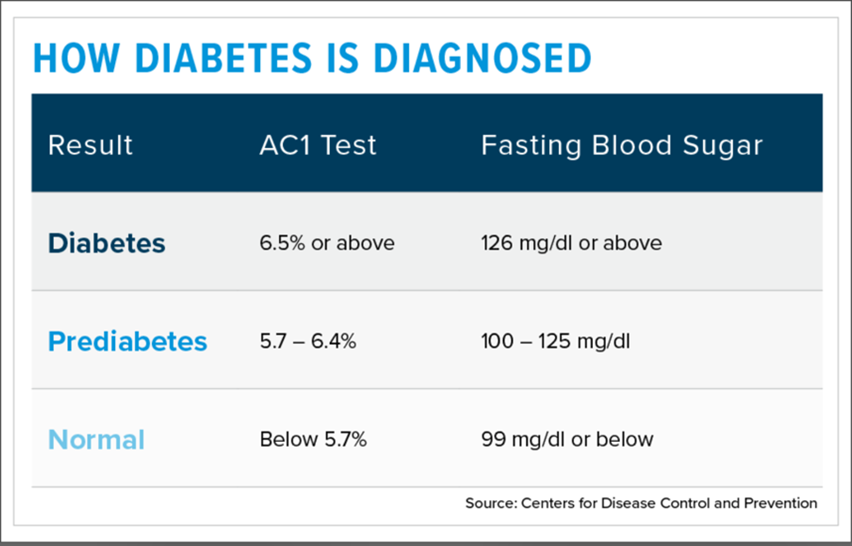Here’s what you need to know about the condition that can raise your risk for type 2 diabetes – and what you can do to help reverse it

No one wants to find out they’re not as healthy as they thought. But learning you have prediabetes might be helpful. Why is that? Because it gives you a heads-up that you’re at higher risk for type 2 diabetes before any complications can arise – and it also gives you a real shot at preventing it.
“During this time of slowly increasing blood sugar levels, you can reverse the progression,” says Kirsten Ward. She’s a certified diabetes care and education specialist.
Here’s what you need to know to take charge of prediabetes and set the course for a healthier future.
What exactly is prediabetes?
Think of prediabetes as a warning: Your blood sugar is higher than it should be – but not high enough for a type 2 diabetes diagnosis, according to the American Diabetes Association (ADA). That means your fasting blood sugar level is 100 mg/dL to 125 mg/dL. Your A1C, which is an average measure of your blood sugar over the past three months, is probably between 5.7% and 6.4%. Anything above those upper ranges is considered type 2 diabetes, according to the Centers for Disease Control and Prevention (CDC).

Here’s what normally happens inside the body: The food eaten gets broken down into sugar, which gives a person energy. That sugar travels to all the tissues through the bloodstream. An organ called the pancreas then makes insulin, which is a hormone that helps the cells absorb the sugar.
But when the body can’t use insulin the right way, the sugar can’t move into cells. It stays in the blood instead. And it’s this buildup of sugar in the blood that causes prediabetes.
People who have these risk factors are more likely to get prediabetes:
- Overweight
- Not physically active
- A family history of diabetes
- A history of gestational diabetes (diabetes during pregnancy)
About 96 million U.S. adults – more than 1 in 3 – have prediabetes, according to the CDC. Among those, 84% don’t even know they have it. That’s a big problem, because prediabetes ups the risk of developing type 2 diabetes (which is harder to treat), heart attack, and stroke.
Is it just a matter of time before I develop type 2 diabetes?
No. Progressing from prediabetes to type 2 diabetes isn’t automatic. For some people with prediabetes, taking healthy steps such as losing weight (if needed) can return blood sugar levels to the normal range, according to the ADA.
What should I do now?
To reverse prediabetes, the first step is to talk with your healthcare provider. There’s a very good chance they’ll recommend some or all of the following:
Lose some weight. If you’re overweight, even a relatively small loss can help prevent type 2 diabetes. How small are we talking? Just 10 to 14 pounds for a 200-pound person. That translates to 5% to 7% of total body weight, according to the CDC.
If you need help losing weight, you may be eligible to join the CDC approved program Betr Health® at no additional cost. Betr Health focuses on the big benefits of eating healthier. Those not only include losing weight, but also just feeling better overall. The app helps you track food, weight, and blood sugar. You also get expert coaching and community support.
CDC research has shown that people diagnosed with prediabetes who follow a structured lifestyle-change program such as Betr Health can lower their risk of developing type 2 diabetes by 58%. People 70 and older can cut theirs by 71%.
Move your body more. The recent Physical Activity Guidelines for Americans CDC recommends at least 150 minutes per week of brisk walking or similar activity. Just half an hour, five days a week, covers that. Talk to your doctor before beginning any new exercise routine.
Blue Shield Medicare members may have access to in-person and virtual exercise classes free of charge through SilverSneakers®. If you’re under 65, you might be eligible for low-cost gym memberships through Fitness Your Way™.*
Keep up with your screening tests. Monitoring your A1C results over time will help you and your provider know if your efforts are paying off in better blood sugar control. Your doctor may also recommend regular oral glucose tolerance tests too, says Ward. Based on your screening results, you can make more adjustments if needed.
Ask if medication might be right for you. The ADA recommends that certain people with prediabetes take a medication called metformin along with making those healthy lifestyle changes. Metformin can help keep blood sugar down, but it isn’t for everyone. Speak with your healthcare provider about whether metformin pills should be a piece of your puzzle, based on your age, A1C, and other factors.
Page Last Updated 8/31/22
Y0118_22_089B2_C 08212022
*Fitness locations are not owned or operated by Tivity Health, Inc. or its affiliates. Fitness Your Way membership entitles member to use of the fitness location facilities and amenities available to the holder of a basic membership at the fitness locations.
Betr Health is a registered trademark of Pure Proactive Health, Inc.
SilverSneakers is a registered trademark of Tivity Health, Inc. © 2023 Tivity Health, Inc. All rights reserved.
Tivity Health, Inc. is an independent vendor that provides solutions to improve health and well-being. Fitness Your Way and Tivity Health are trademarks or registered trademarks of Tivity Health, Inc. Tivity Health is solely responsible for the service provided above. All other brand names, product names, registered trademarks, or trademarks belong to their respective holders. © 2023 Tivity Health, Inc. All rights reserved.
Wellvolution is a registered trademark of Blue Shield of California. Wellvolution and all associated digital and in-person health programs, services, and offerings are managed by Solera, Inc. These program services are not a covered benefit of Blue Shield health plans and none of the terms or conditions of Blue Shield health plans apply. Blue Shield reserves the right to terminate this program at any time without notice. Please note that for Medicare Advantage Plan members, Wellvolution is neither offered nor guaranteed under our contract with the Medicare program, nor is it subject to the Medicare appeals process. Any disputes regarding Wellvolution may be subject to the plan’s grievance process.
The company complies with applicable state laws and federal civil rights laws and does not discriminate, exclude people, or treat them differently on the basis of race, color, national origin, ethnic group identification, medical condition, genetic information, ancestry, religion, sex, marital status, gender, gender identity, sexual orientation, age, mental disability, or physical disability. La compañía cumple con las leyes de derechos civiles federales y estatales aplicables, y no discrimina, ni excluye ni trata de manera diferente a las personas por su raza, color, país de origen, identificación con determinado grupo étnico, condición médica, información genética, ascendencia, religión, sexo, estado civil, género, identidad de género, orientación sexual, edad, ni discapacidad física ni mental. 本公司遵守適用的州法律和聯邦民權法律,並且不會以種族、膚色、原國籍、族群認同、醫療狀況、遺傳資訊、血統、宗教、性別、婚姻狀況、性別認同、性取向、年齡、精神殘疾或身體殘疾而進行歧視、排斥或區別對待他人。





